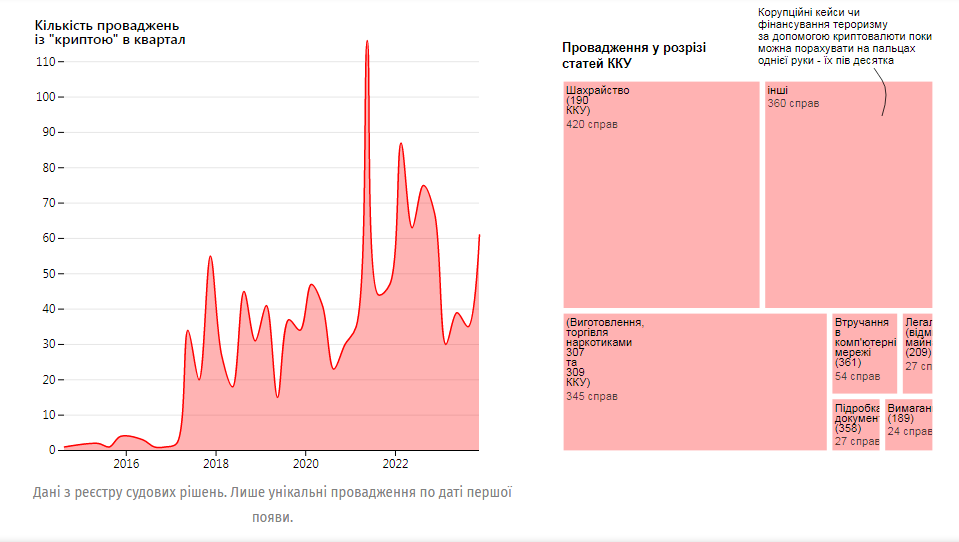
“Crypto” has replaced “black cash”: criminals are increasingly using cryptocurrencies
Since 2014, the Unified State Register of Court Decisions has included information on more than 1,500 court rulings in criminal proceedings that contain the keywords “cryptocurrency,” Bitcoin, and other names of virtual coins. Guilty verdicts have been announced in a third of the cases.
The entry of cryptocurrencies into the Ukrainian “criminal space” can be divided into three stages. The first one is until 2017. Since the emergence of virtual assets and until then, there have been no crimes where cryptocurrency was used as a weapon in every sense of the word for law enforcement.
They emerged as a mass phenomenon in 2017, when there was a real explosion of investigations into cryptocurrency-related cases. This was the second stage.
The third started at the beginning of the Great War. The open data analyzed by the EP shows a decrease in the number of such cases. Although, given the development and spread of cryptocurrencies in Ukraine and the world, it should have been the other way around.
The reason is simple: cryptocurrencies are replacing cash, which has been a traditional tool for maintaining anonymity in corruption cases for centuries. For example, in the fall of 2023, the Specialized Anti-Corruption Prosecutor’s Office and the National Anti-Corruption Bureau served a notice of suspicion on MP Andriy Odarchenko (Servant of the People), who allegedly offered $50,000 in bribes in Bitcoin.
However, as the analysis of the court register shows, mentions of cryptocurrencies make up only a fraction of all 475 thousand criminal proceedings opened in 2023.

One possible reason is that law enforcement officers lack the qualifications to conduct complex investigations into money laundering or corruption.
Cryptocurrency is most often mentioned in cases investigated under Art. 190 of the Criminal Code “Fraud”. The standard plot of such cases is as follows: “He committed illegal activities related to the fraudulent seizure of citizens’ funds in the field of e-commerce, in particular, by raising funds in virtual projects (so-called pyramid schemes).”
The actions described in Art. 361 of the Criminal Code of Ukraine – unauthorized interference with the operation of information and electronic communication systems. This definition usually hides proceedings regarding the operation of call centers.
Their employees “by making phone calls under the guise of representatives of companies providing financial services in the field of cryptocurrencies and investment companies, lure digital assets (cryptocurrency), card account details, logins and passwords to cryptocurrency exchanges from victims.”
Next – Art. 307 of the Criminal Code (illegal production, manufacture, acquisition, storage, transportation, shipment or sale of drugs) and Art. 309 of the Criminal Code (the same without sale).
Cryptocurrencies are being used in a growing number of criminal offenses, as evidenced by the example of a bribe to a deputy. Illegal wealth is being legalized through virtual assets, stolen instead of cash from banks, and governments are sounding the alarm: “crypto” is a powerful tool for financing terrorism, and Ukraine is no exception.
According to the SBU, cryptocurrency transfers to electronic wallets of unknown people are one of the most important channels of financing for the so-called LDNR. The SBU found an account for Bitcoin and Ethereum transfers in support of the “DPR” in the Russian social network Odnoklassniki. Law enforcement officers tracked online transfers in favor of this wallet and thus found the terrorists’ sponsors.
Usually, large schemes are more carefully organized, and the SBU admits that it is almost impossible to track them. Investigations into such cases are still rare.
Ukrainian law enforcement is only learning how to do this. At the beginning of 2023, 250 NABU detectives began to learn about cryptocurrency technologies as part of the US-funded CryptoEdge program. They learn how to use tools like Crystal, which can be compared to the business analog YouControl.
“With a wallet address, Crystal allows you to get detailed information about the owner and transactions,” said MP Yaroslav Zheleznyak.
According to court rulings, law enforcement agencies hardly ever use this software. Chainalysis, created by the British to track suspicious transactions, is mentioned in only two Ukrainian court rulings.
At the same time, de-anonymization is the key to reducing the popularity of cryptocurrencies as a tool for committing crimes. This can be partly done by government regulation: a draft law on virtual assets is currently under development.

